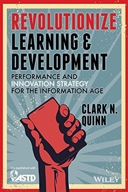- Home
- Articles
- Reviews
- About
- Archives
- Past Issues
- The eLearn Blog
Archives
| To leave a comment you must sign in. Please log in or create an ACM Account. Forgot your username or password? |
|
Create an ACM Account |

Clark Quinn has done it again-written an engaging text for performance and development professionals that will help move the field forward, embracing the new world of work. In Revolutionize Learning and Development, Quinn points out what is often omitted from performance and development units in organizations—the need for actual results in workplace performance over an evaluation of the "training" or "course" as it is offered. Does your company's learning allow people to optimally execute their work? Does it encourage continual innovation? Or are you currently operating in the mode of "The executive says this is a problem; therefore, we should build a course to teach people to do better." If so (and even if not), this book gives clear ways to examine current practices and to make necessary changes to optimize the learning and performance field both within the enterprise and across the system as a whole.
Just because you can make a course or program, doesn't mean that you should—it doesn't even mean that you should try. Clark Quinn makes clear the necessity for professionals in the field to use data to make decisions as to whether a course or training is needed, rather than just going with what a SME or executive says is needed. He clearly outlines that design and training staff should go out into the field to see the real work being done in order to be more effective in improving performance, and to connect workplace learning to metrics involved in doing that work well. Making clear connections, indeed, tethering learning to performance is not only currently lacking, but is today absolutely necessary.
The author makes it clear that courses and programs—e.g., formal learning interventions—should not be the first instinct in performance and development. Is there material in the world that would solve the problem or help with facilitation in a task? Use that. Is there a network of people to ask? Use them. Asking employees to think about and reflect on their learning, rather than just "giving" them courses to take, is vitally important. In fact, facilitating metacognition and meta-learning in the organization offers enormous potential to create capable employees.
Drawing from a variety of leaders in the field, Quinn outlines the ways we could and should structure performance and development to improve business value. These changes include working out loud, drawing on a community of resources, leveraging technology, and utilizing (or even creating) informal learning structures to leverage the knowledge and skills of the network.
In addition, he makes a clear case for why culture change is vital to the success of such a venture. Culture change is not easy; and while acknowledging this, Quinn offers ways to get buy-in from top management and to begin making the shifts that are desirable in organizations. To Quinn, keys are "trust" and "transparency." (p. 134). He writes, "You cannot fake it. Your employees will react to the real culture, not the touted culture." He encourages the reader to work on the strategy even before culture change has happened, allowing a symbiotic relationship between culture and strategy to develop as both change over time.
As far as how performance and development units are positioned, Quinn states P&D should be not only closely tied to IT, but also positioned at the executive level. This change allows learning professionals to not only enact strategic changes, but also to support their work in the ways required by todays' environment. For example, Quinn successfully argues the role of P&D should be to support work—not to just be about learning. In supporting work, one inevitably supports learning, as well.
For individuals working in performance and development who do not have the position to make wholesale changes in the organization's culture or strategy, this book does offer some suggestions to make small, focused changes where they can. Overall, this work is a good read, and synthesizes a lot about where performance and development should be moving in the future.
Stevie Rocco has 14 years experience working with faculty to create and manage online learning. At Penn State's College of Earth and Mineral Sciences, she and her team work to create tools and technologies that improve online course experiences. In addition, Rocco consults on a wide variety of topics, including faculty development for online teaching, copyright and creative commons, accessibility, usability, open source/free tools, and social media. She holds a B.S. in secondary education, and a M.Ed. in adult education.
Permission to make digital or hard copies of part or all of this work for personal or classroom use is granted without fee provided that copies are not made or distributed for profit or commercial advantage and that copies bear this notice and the full citation on the first page. Copyrights for third-party components of this work must be honored. For all other uses, contact the Owner/Author.
2014 Copyright held by the Owner/Author. 1535-394X/14/09-2662453
|
To leave a comment you must sign in. |
|
Create an ACM Account. |